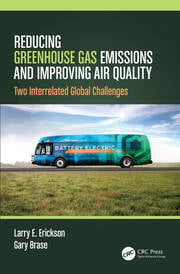ABSTRACT
Air quality is a major environmental issue, with ambient air quality in large cities and indoor air quality (where solid fuels are a source of energy) being two aspects of air quality that have major significance. The social cost of illness and early mortality from poor air quality exceeds $4 trillion per year. A particular risk is particulates in the air smaller than 2.5 micrometers (PM2.5) that impact health by entering the lungs and finding their way into locations where they have health effects. Nitrogen oxides, ozone, sulfur dioxide, and volatile organic compounds in ambient air also have health impacts. Efforts to improve air quality by reducing the amount of electricity generated from the combustion of fossil fuels and by electrifying transportation are in progress in many parts of the world. Household air pollution can be reduced by cooking and heating with gas or electricity rather than solid fuels. Improving air quality is a high priority in many locations and there is a need to continue to take significant and decisive actions on this front. Reducing greenhouse gas emissions by 80% by 2050 will be beneficial to communities that are working to improve air quality.


